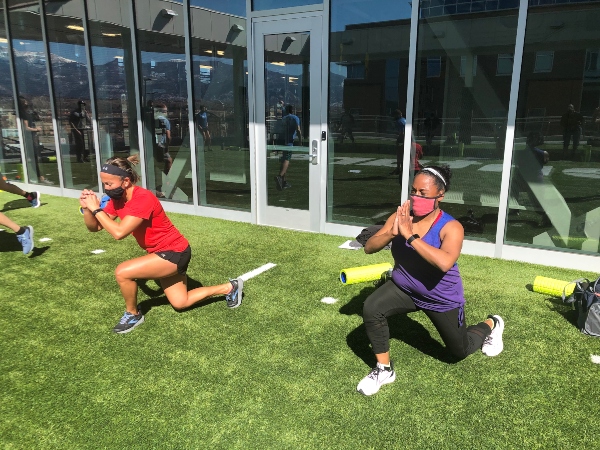Health Education Important to Wounded Warrior Wellness

Healthy living is not easy, especially for those coping with injury and illness after service. Because every person’s journey is unique, health education is paramount. It empowers warriors and their families to make smart, healthy decisions for themselves. This education can help with developing a physical wellness plan that includes SMART goals while considering factors such as religion, culture, gender, and more.
Learn more about Wounded Warrior Project® (WWP) health education workshops.
“I struggle with anxiety,” explained U.S. Army veteran Edelina Calle. “It’s something that comes and goes, and I was having trouble staying balanced in life.”
Edelina is not the only warrior coping with the impact of her mental health on her physical wellness.
In its 2020 Annual Warrior Survey, WWP found that more than 60% of warriors reported experiencing moderate to severe depression symptoms, 66% reported loneliness, and 30% had recent suicidal ideation. Still, approximately 70% of the same warriors surveyed reported that they believe physical activity decreases feelings of stress or tension and improves mental health. The connection between the mind and body is powerful, and WWP has created programs and services to focus on improving both — together.
WWP’s Physical Health and Wellness program helps to strengthen recovery by focusing on the mind-body connection. The program’s virtual and in-person opportunities include health coaching, yoga and meditation classes, cooking workshops, nutrition classes, at-home fitness workouts modified to use common household items, and more.
The program’s multi-day health education workshops provide warriors and their families instruction in basic movement, nutrition, recovery, and optimal sleep habits. Over the last year, WWP has offered more than 60 virtual and in-person workshops across the nation.
“I came here to shift my life away from depression and feeling down,” Edelina said. “I’m going to use the tools I get today and put them in action. I am changing my nutrition and the way I exercise, and I’m looking forward to my transformation.”
To empower participants to achieve their goals, a WWP Physical Health and Wellness coach provides 90 days of support following the workshop. Edelina and other participants will create tangible goals with their coach and have regular check-in calls. Edelina will also stay connected to the warriors who attended the same workshop through group check-in calls and other health and wellness events. This peer support element plays an essential role as injured veterans motivate and support each other in a way only they can.
“These events give us an opportunity to interact with other warriors who have similar symptoms and emotions,” Edelina said. “There is a camaraderie that is different than what I have with my civilian friends.”
It all connects to helping warriors and their families live a healthier life. Last year, of warriors who were coached through the WWP physical wellness program, more than 44% reported better quality nutrition, 48% reported reduced pain, 52% reported changes in sleep quality, and warriors lost an average of 7 pounds.
“I’m going to be a happier person,” Edelina said. “I feel the change, and I’m really grateful.”
Contact: Vesta M. Anderson – Public Relations, vanderson@woundedwarriorproject.org, 904.570.0771
About Wounded Warrior Project
Since 2003, Wounded Warrior Project® (WWP) has been meeting the growing needs of warriors, their families, and caregivers – helping them achieve their highest ambition. Learn more.